Vietnam forges ahead with US ties
Vietnam forges ahead with US ties
By Giang Nguyen BBC, Vietnamese service
By Giang Nguyen BBC, Vietnamese service
Nguyen Minh Triet has made history this week as the first Vietnamese president to visit the United States since the war ended in 1975.
The trip marks a high point in the increasingly cordial relationships between the former enemies.
It also has huge implications for Vietnam at home and abroad.
But the president will be hoping that US concerns over human rights in his country do not overshadow his visit.
Things have changes since Mr Triet was a Viet Cong fighter in the jungle - on this trip, he will be received at the White House.
His efforts to promote trade and attract more US investment in Vietnam have proved popular in American business circles, but there is a lot riding on the visit back in Vietnam.
Capitalist reforms
A renowned reformist and business-friendly pragmatist, Mr Triet, 64, and his supporters have spent years building up their political credentials by following a policy of economic liberalisation while holding on to their communist principles.
If they had one, their motto would probably be something like, "the bigger the market, the better" - not just for the party, but also for government officials and their families.
Wealth is no longer a badge of shame in Communist Vietnam, and last year the government passed legislation allowing its members to be have unlimited involvement in private business, thus dismissing a major piece of socialist dogma.
The downside is that corruption is rampant, and the richest people in Vietnam are often those who are able to use their privileged access to information to manipulate the property market and export quotas, and who acquire millions of dollars-worth of shares in newly privatised enterprises.
This week, a former Vietnamese deputy trade minister, Mai Van Dau, was given a 12-year sentence for bribery relating to US textile quotas.
His son, 35 year-old Mai Thanh Hai, will serve a five-year sentence for using his father's influence to extort $35,000 from garment companies, and for using a fake university diploma to secure his ministry post.
Domestic support
A successful visit to the US will further strengthen Mr Triet's vision of a strong, authoritative Vietnam supported by Washington and international financial institutions.
Experts such as J Peter Pham of the James Madison University in Virginia also believe the US has a unique opportunity to make Vietnam a valuable ally in possible future attempts by Washington to control Chinese expansion.
We want the US government to engage more with Hanoi to give them more chance to relax political freedoms Thai Van Tran Californian State Assembly
The visit to the White House will certainly help Mr Triet weaken the so-called Northern Faction, which is keen on a closer relationship with China and resistant of efforts to reform the party apparatus.
The group is reportedly run from behind the Vietnamese political scene by retired leaders such as Do Muoi and Le Duc Anh.
It is represented by the party's Secretary General Nong Duc Manh, who made a friendly visit to Cuba early this month.
Mr Triet clearly hopes that a strong partnership with the US will guarantee political stability for Hanoi in the years to come, and give international legitimacy to the ruling Communist Party.
Such legitimacy could, however, be used as cover when harassing political dissidents.
Human rights concerns
Mr Triet knows that making friends in the US is not easy, and that international criticism of Vietnam's human rights situation will complicate the talks.
The Vietnamese-American community has already staged demonstrations against the visit, and recently US President George Bush has been more outspoken than ever about developing democracy in the world.
He went as far as mentioning Vietnam in a speech at the recent G8 summit in Germany, criticising the state authorities for rolling back earlier "freedom".
In an unusual move designed to address public concerns, Mr Bush invited four American-based Vietnamese human rights activists to the White House in May.
Meanwhile, Vice-President Dick Cheney received letter from Vietnamese dissident Hoang Minh Chinh in Hanoi as recently as 14 June.
Recently, Hanoi was pressured by Washington into releasing Nguyen Vu Binh, a dissident journalist, and Le Quoc Quan, a lawyer who had campaigned for political pluralism.
Pragmatic approach
But there has been a marked change in the mood of the exiled Vietnamese.
Many now believe forging business links with Vietnam is a priority.
Trinh Trung, a businessman in Virginia, told the BBC's Vietnamese service: "Yes, they can talk about human rights and religious freedom every year, but we keep doing business with Vietnam. Freedom is about people's free choice after all."
Others, like Thai Van Tran, a Vietnamese-born member of the Californian State Assembly, want to promote trade with Hanoi but also want to keep democracy and human rights high on the agenda.
"We want the US government to engage more with Hanoi to give them more chance to relax political freedom," he said.
But some war veterans in Vietnam are concerned about Hanoi's attempts at a rapprochement.
Thanh Thao, a former Viet Cong and poet renowned for his democratic views, warned the leadership not to make friends with Washington too fast and at all costs.
"We need a roadmap. We the Vietnamese are always in a rush to make friends," he said.
Talking on an overseas Vietnamese website to fellow writers, Thanh Thao said he wanted the Vietnamese to build a truly "free society" before engaging into a new relationship with the US.
Desire for change
While the Bush administration knows that it cannot ignore the voices of the two-million strong Vietnamese-American community in their dealings with Vietnam, it would be wrong to assume that Mr Bush and his successor will seek to change Vietnamese politics overnight.
Vietnam will remain a mono-party system in the years to come, but a closer relationship with the US will inevitably mean more American influence in the Vietnamese policy-making process.
And this is exactly what some of the reformists in Hanoi want.
Nguyen Dinh Luong, Vietnam's former chief negotiator at the WTO, said Vietnam needed to "increase Americanism" in its economy.
In other words, he said, Vietnam can only make the best out of US investments with a deep structural reform and a professional civil servants corps.
Despite the differing views on human rights, democracy and religious freedoms, there has never been so much support for developing mutual trade and a US engagement with Vietnam.
The trip marks a high point in the increasingly cordial relationships between the former enemies.
It also has huge implications for Vietnam at home and abroad.
But the president will be hoping that US concerns over human rights in his country do not overshadow his visit.
Things have changes since Mr Triet was a Viet Cong fighter in the jungle - on this trip, he will be received at the White House.
His efforts to promote trade and attract more US investment in Vietnam have proved popular in American business circles, but there is a lot riding on the visit back in Vietnam.
Capitalist reforms
A renowned reformist and business-friendly pragmatist, Mr Triet, 64, and his supporters have spent years building up their political credentials by following a policy of economic liberalisation while holding on to their communist principles.
If they had one, their motto would probably be something like, "the bigger the market, the better" - not just for the party, but also for government officials and their families.
Wealth is no longer a badge of shame in Communist Vietnam, and last year the government passed legislation allowing its members to be have unlimited involvement in private business, thus dismissing a major piece of socialist dogma.
The downside is that corruption is rampant, and the richest people in Vietnam are often those who are able to use their privileged access to information to manipulate the property market and export quotas, and who acquire millions of dollars-worth of shares in newly privatised enterprises.
This week, a former Vietnamese deputy trade minister, Mai Van Dau, was given a 12-year sentence for bribery relating to US textile quotas.
His son, 35 year-old Mai Thanh Hai, will serve a five-year sentence for using his father's influence to extort $35,000 from garment companies, and for using a fake university diploma to secure his ministry post.
Domestic support
A successful visit to the US will further strengthen Mr Triet's vision of a strong, authoritative Vietnam supported by Washington and international financial institutions.
Experts such as J Peter Pham of the James Madison University in Virginia also believe the US has a unique opportunity to make Vietnam a valuable ally in possible future attempts by Washington to control Chinese expansion.
We want the US government to engage more with Hanoi to give them more chance to relax political freedoms Thai Van Tran Californian State Assembly
The visit to the White House will certainly help Mr Triet weaken the so-called Northern Faction, which is keen on a closer relationship with China and resistant of efforts to reform the party apparatus.
The group is reportedly run from behind the Vietnamese political scene by retired leaders such as Do Muoi and Le Duc Anh.
It is represented by the party's Secretary General Nong Duc Manh, who made a friendly visit to Cuba early this month.
Mr Triet clearly hopes that a strong partnership with the US will guarantee political stability for Hanoi in the years to come, and give international legitimacy to the ruling Communist Party.
Such legitimacy could, however, be used as cover when harassing political dissidents.
Human rights concerns
Mr Triet knows that making friends in the US is not easy, and that international criticism of Vietnam's human rights situation will complicate the talks.
The Vietnamese-American community has already staged demonstrations against the visit, and recently US President George Bush has been more outspoken than ever about developing democracy in the world.
He went as far as mentioning Vietnam in a speech at the recent G8 summit in Germany, criticising the state authorities for rolling back earlier "freedom".
In an unusual move designed to address public concerns, Mr Bush invited four American-based Vietnamese human rights activists to the White House in May.
Meanwhile, Vice-President Dick Cheney received letter from Vietnamese dissident Hoang Minh Chinh in Hanoi as recently as 14 June.
Recently, Hanoi was pressured by Washington into releasing Nguyen Vu Binh, a dissident journalist, and Le Quoc Quan, a lawyer who had campaigned for political pluralism.
Pragmatic approach
But there has been a marked change in the mood of the exiled Vietnamese.
Many now believe forging business links with Vietnam is a priority.
Trinh Trung, a businessman in Virginia, told the BBC's Vietnamese service: "Yes, they can talk about human rights and religious freedom every year, but we keep doing business with Vietnam. Freedom is about people's free choice after all."
Others, like Thai Van Tran, a Vietnamese-born member of the Californian State Assembly, want to promote trade with Hanoi but also want to keep democracy and human rights high on the agenda.
"We want the US government to engage more with Hanoi to give them more chance to relax political freedom," he said.
But some war veterans in Vietnam are concerned about Hanoi's attempts at a rapprochement.
Thanh Thao, a former Viet Cong and poet renowned for his democratic views, warned the leadership not to make friends with Washington too fast and at all costs.
"We need a roadmap. We the Vietnamese are always in a rush to make friends," he said.
Talking on an overseas Vietnamese website to fellow writers, Thanh Thao said he wanted the Vietnamese to build a truly "free society" before engaging into a new relationship with the US.
Desire for change
While the Bush administration knows that it cannot ignore the voices of the two-million strong Vietnamese-American community in their dealings with Vietnam, it would be wrong to assume that Mr Bush and his successor will seek to change Vietnamese politics overnight.
Vietnam will remain a mono-party system in the years to come, but a closer relationship with the US will inevitably mean more American influence in the Vietnamese policy-making process.
And this is exactly what some of the reformists in Hanoi want.
Nguyen Dinh Luong, Vietnam's former chief negotiator at the WTO, said Vietnam needed to "increase Americanism" in its economy.
In other words, he said, Vietnam can only make the best out of US investments with a deep structural reform and a professional civil servants corps.
Despite the differing views on human rights, democracy and religious freedoms, there has never been so much support for developing mutual trade and a US engagement with Vietnam.







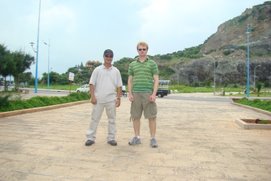




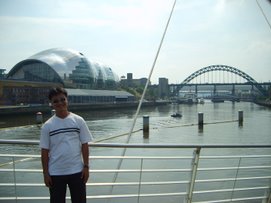



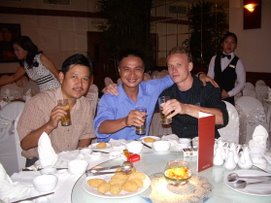


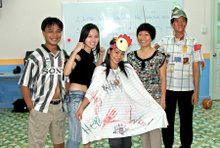
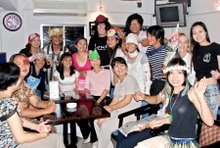
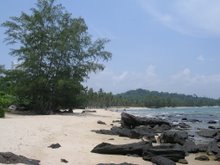

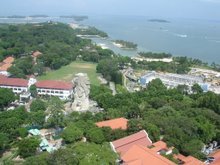




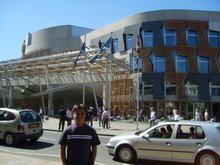
No comments:
Post a Comment